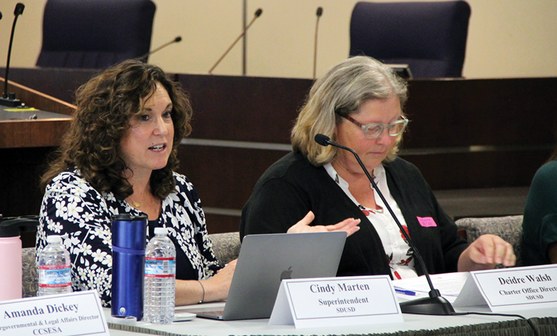Charter panel discusses authorization best practices
July 29, 2019
Charter school authorization and oversight can look very different depending on a district’s size and resources, as was related during a panel discussion June 26 in Sacramento.
The panel, hosted by State Superintendent of Public Instruction Tony Thurmond, was to explore and suggest best practices for the authorization and renewal process for California charter schools, following the release of a report from Thurmond’s Charter Task Force.
ACSA Senior Director of Governmental Relations Edgar Zazueta, who served on that task force, gave opening remarks.
“One can make an argument that this discussion about best practices and charter authorization might have the biggest impact in terms of what is in the best interest of students,” he said.
Tony Thurmond said those on the panel have been living with the “authorization challenge” for a long time, without clear legal definitions.
“We’re hoping that we can reduce some of the consternation and fighting about what the role of charter schools is in California by lending ideas about where clear authorization should happen,” he said.
Panelists included Superintendent Cindy Marten of the San Diego Unified School District, which oversees 46 charters with an enrollment of 21,000 students.
Marten, who was on the CDE’s Charter Task Force, said that in the last six years, the district has only denied five new charter petitions, and three charter renewals.
“For me it’s very clear what we need in terms of local discretion and what local discretion would look like in the areas of saturation, uniqueness of program and fiscal impact,” she said.
SDUSD has an office and staff dedicated to charters. Deidre Walsh, manager of the SDUSD Office of Charter Schools, shared that her district uses a Charter Advisory Group, which includes district officials and leaders at other charter schools, each knowledgeable in specific areas of education.
“For me it’s very clear ... what local discretion would look like in the areas of saturation, uniqueness of program and fiscal impact.”–Cindy Marten, Superintendent, San Diego USD
Walsh said that many petitions use the same language, so in-person interviews have become even more vital for evaluating the potential for a school to succeed.
Regarding oversight duties, Walsh noted that the law is very “skeletal,” leaving districts to come up with their own polices here. At SDUSD, the Office of Charter Schools conducts detailed annual site visits where district staff spend a day at each charter school every year, reviewing documents and meeting with teachers, administrators, board, students and parents. Staff also perform shorter unannounced site visits to “spot check” certain areas of concern.
While authorizers like the San Diego USD have offices dedicated to charter schools, others try to manage this role amid many other demands.
“Capacity is a real problem,” said panelist Stephanie Farland, a consultant who works with LEAs around the state. “Most authorizers, districts and counties, it’s a small percentage of somebody’s job, and that small percentage usually takes up a lot of time, which means that they’re not focusing on the work in the district or county that they’re supposed to be focusing on.”

San Diego USD Superintendent Cindy Marten and Office of Charter Schools Manager Deidre Walsh shared practices their district uses to authorize and oversee charter schools in a June 26 panel discussion.


